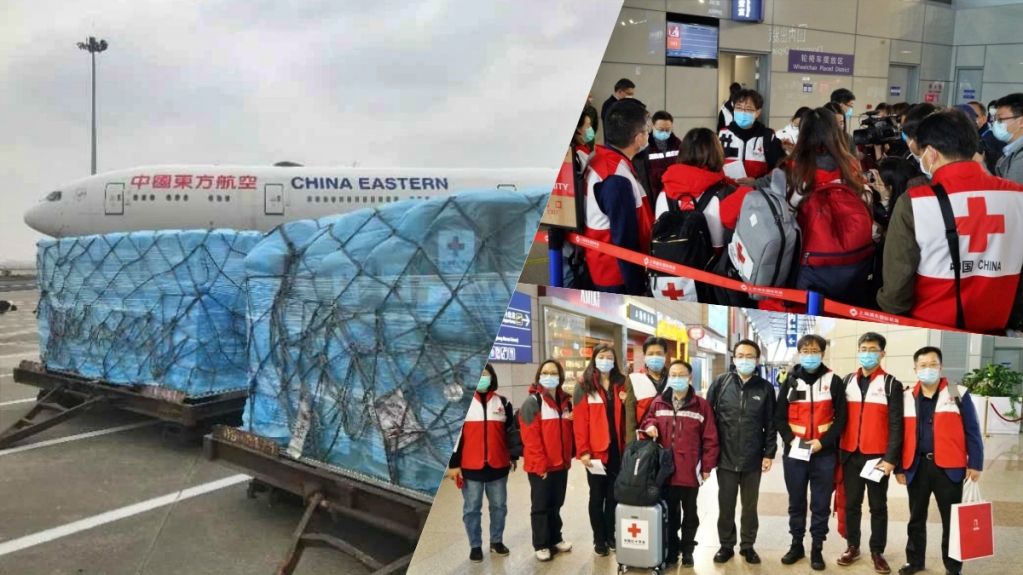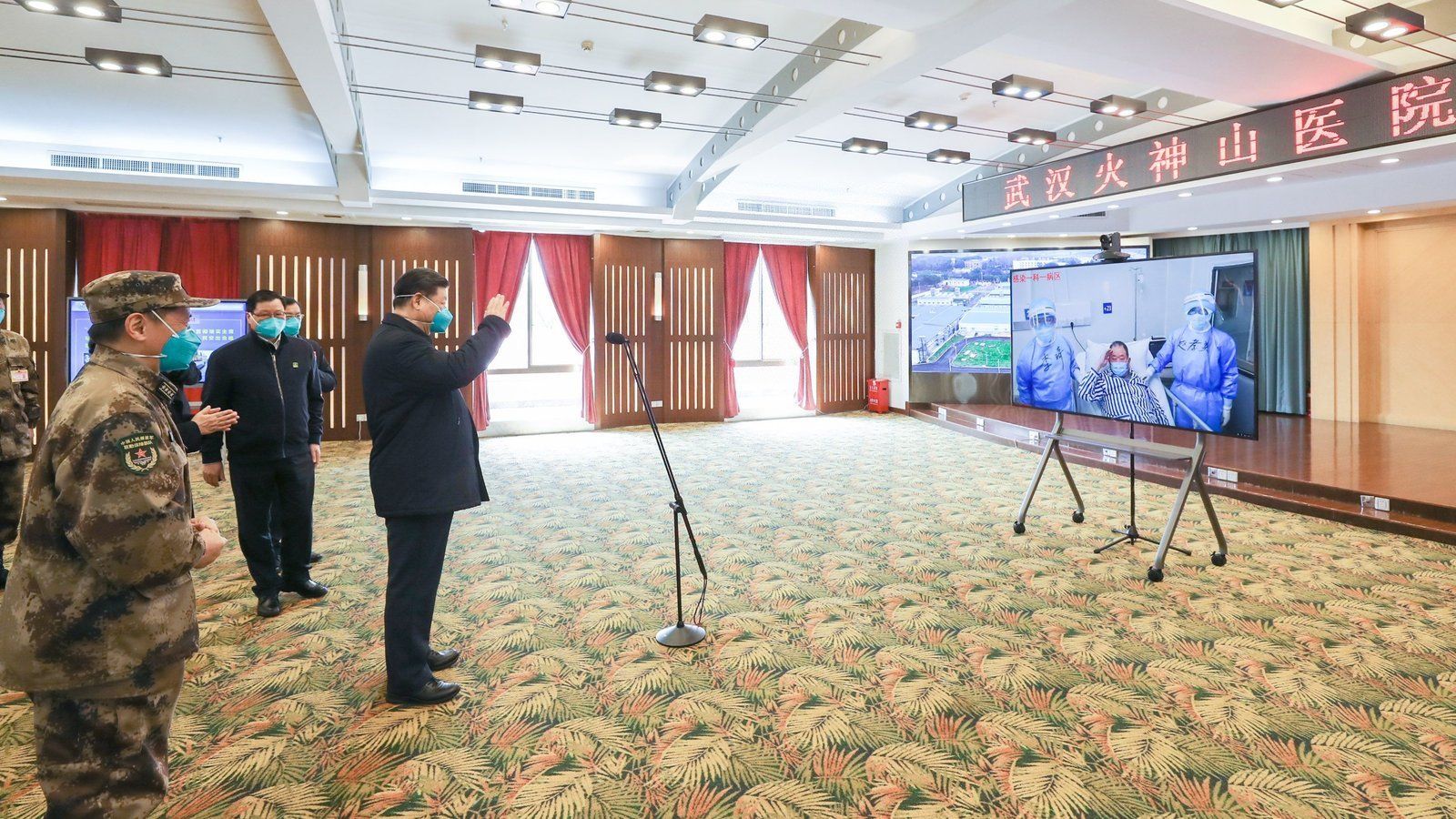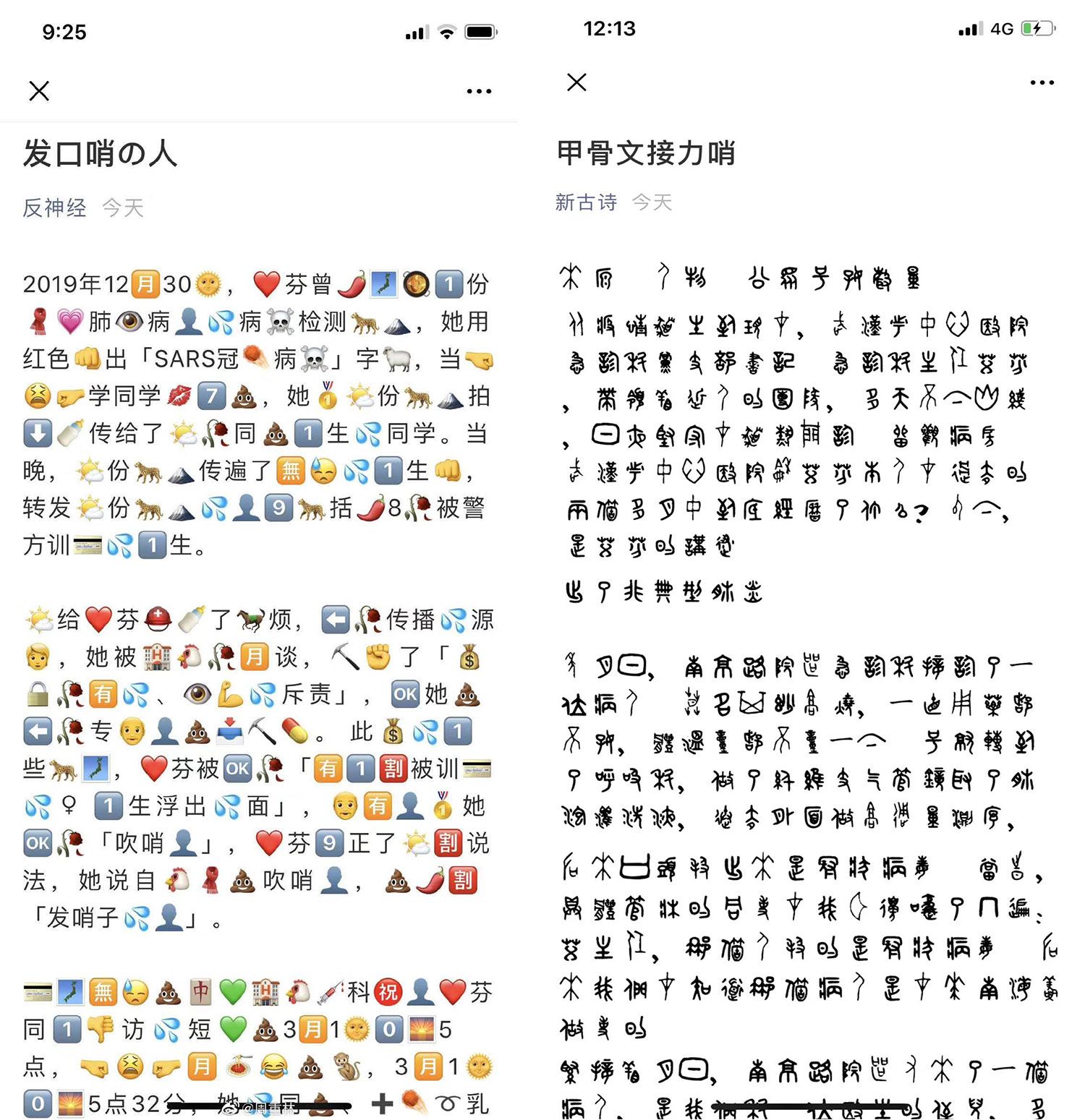Brief #15: propaganda, Xi in Wuhan, censorship & "translations", Xinjiang bill
Hi all,
Yun is practising social distancing amongst non-believers while Adam is in Wrocław for the weekend. Remember to wash your hands!
- Yun and Adam
1. Propaganda on COVID-19
CCP’s propaganda throughout this COVID-19 pandemic has been a typical example of how the Party usually operates. It appears we’re now moving towards the new phase — blaming “foreign hostile forces”.
We have been following and writing about China’s response to COVID-19 since the beginning of this year. The Chinese authorities’ first instinct was the suppression of information. After realising that paper cannot stifle a fire, it then turned its propaganda effort to mobilisation — how the Government has acted decisively to build hospitals in record times and lockdown entire cities. For two weeks, it allows some non-state-sanctioned information to flow. The authorities then clamped down hard on information control again, with the emphasis being placed on telling positive stories. So the heroic efforts of frontline workers were highlighted while the sufferings of the patients were downplayed.
Now that China’s new cases are declining and some parts of the country are preparing to resume normal life, the focus of the propaganda has shifted — it is attempting to sow doubts into people’s mind about the origin of the virus, suggesting that it may have come from the US rather than China. The Foreign Ministry spokesperson Lijian Zhao has even tweeted a conspiracy theory that the virus came from a US military bio-lab. On WeChat, articles claiming the US origin of the virus has been allowed to spread (in contrast to posts that criticise the Chinese Government, see below).
Alongside this deflection of blame, China has also been emphasising how other (especially Western) countries are unable to act decisively in order to contain the pandemic. This is, of course, a standard framing — everything in China is going well, people are happy, while everywhere outside China is chaotic. This propaganda is helped by the fact that many countries in the West are not taking this seriously, comparing to countries in Asia, such as South Korea, Singapore and Taiwan. This effort seems to be quite successful — Yun’s family has been urging Yun to go back to China to escape the unfolding pandemic.
On a more positive note, China is helping other countries to deal with the pandemic. This is likely to be important for countries such as Iran, which is under sanctions. State media has also been focused on the medical help and medical supplies that China is providing to Italy. This, coupled with sowing doubts on the origin of the virus, is China’s attempt to tell a good story to the world: we didn’t start it, but we’re helping everyone else anyway; we’re a good global citizen, unlike America First. China no doubt hopes that it will turn around the criticisms it has been receiving about its handling of the outbreak in January.

The Trump Administration, on the other hand, has been highlighting the “foreign” origin of the virus. Trump has even linked this to his border control and immigration measures, including building the wall. The emphasis on “foreign” is an attempt to deflect responsibility as well as playing to the xenophobia of many in his base.
Unfortunately, it appears that point-scoring has overtaken public health concerns at the political level, in both China and the US.
2. Xi’s visit to Wuhan
Xi finally visited Wuhan, the first time since the outbreak began. Xi’s absence at the epicentre has been noted and contrasted with past leaders who usually arrive on the scene soon after a disaster strikes. Li Keqiang visited Wuhan in late January.

After the backlash last week about gratitude, Xi learnt his lesson well and praised the heroic sacrifices of the citizens of Wuhan instead.
Xi’s trip was designed to signal to people in China that the worst is over and better days are ahead. This is his victory tour to restore confidence and reassure everyone that normal life will soon resume. Prior to this, Xi has kept mostly out of media spotlight when it comes to the outbreak, which would have allowed him to somewhat disassociate himself if things went badly.
The propaganda around Xi’s visit cast him as a paternal figure, humanising him as he instructed that a steady supply of fish for Wuhan must be ensured. The state media proclaimed “His heart contains everyone (他心里装着所有人).” Somewhat imperial sounding, like a benevolent, magnanimous emperor, does it not?
On this trip, Xi also directly addressed the criticisms of officials by the people. He called these criticisms “emotional vent”, and said it is just a result of staying at home for too long (群众在家隔离时间长了,发几句牢骚是可以理解的,谁愿意老闷在家里啊). This appears to be a signal that any criticisms by the people about how the CCP has handled the outbreak will be mostly brushed off as venting. Do not hold your breaths for any major reforms coming out of this.
3. Censorship avoidance
Chinese netizen’s creativity is on the show again this week, as they try to evade censorship of an interview article. The interview is with a Wuhan doctor Ai Fen (艾芬) and titled The One Who Handed Out the Whistles (发哨子的人). The most famous quote is:
早知道有今天,我管他批评不批评我,老子到处说!
Had I known the situation would be like it is today, I wouldn’t care if I get criticised or not, I would’ve told everyone!
As the interview was quickly “harmonised”, netizens have “translated” the interview into different languages in order to forward it on. These various “translations” include Literary Chinese, “Martian”, QR code, and Klingon. Below are the emoji and oracle bone versions:

The fact that so much effort has been put in by Chinese people to ensure the spread of Ai Fen’s story despite censorship shows that people do care about the freedom to express themselves.
Chinese investigative journalist turned commentator Wang Zhian (王志安) said something the other day that resonated with us:
All those who work for the truth [within China] deserves the respect of the world. For example, Li Wenliang, Ai Fen, Fang Fang, such as Caixin Media, such as Weibo that kept a post as long as possible, for several hours. They are real brave ones, and they are the hope of China in the future. A few days ago, someone wondered why I was glowing in pride when I came on Twitter, the reason is this. Compared with the dedication and devotion [to truth] within [China’s] borders, the commentary here on Twitter is not even a fart.
Wang is right. The brave ones are within China, risking their careers, and in some cases, their lives, to try and tell the truth and push for changes.
Real change in China comes from the cumulation of billions of actions by normal people within the country itself, instead of rhetoric from the west.
4. US proposes new bill on Xinjiang imports
A bipartisan group in the US Congress has proposed a bill (Uyghur Forced Labor Prevention Act) that would see tightened restrictions on imports from Xinjiang to the US. The bill is a result of recent concerns that factories in China are using Uyghurs as forced labour to manufacture goods for exports.
The proposed bill would require importers to obtain certification from the US Government that the goods were not produced using forced labour. The US has already banned the import of products using forced labour, but this bill goes a step further by reversing the burden of proof — all products from Xinjing are presumed to have used forced labour unless proven otherwise.
One-third of US apparel is imported from China, and Xinjiang produces 84 per cent of China’s total cotton production. The Congressional-Executive Commission on China found that it is “increasingly impossible to conduct due diligence”. This means any certification may be extremely onerous to obtain. If the bill was to pass, it will likely stop any imports of products with Xinjiang in its supply chain.
Last week, ASPI released a report showing that forced labour may be “exported” to outside Xinjiang, around China. However, any attempt to expand this arrangement to the entire country will face severe backlash and is highly unrealistic. The US Government would not have enough resources to certify all imports from China.
If we really care about human rights in Xinjiang, then the world would be doing more, by effectively imposing a higher cost on the party-state for what is one of the most grave human rights abuses in the 21st century.
Our actions form a mirror that tells us who we really are.
